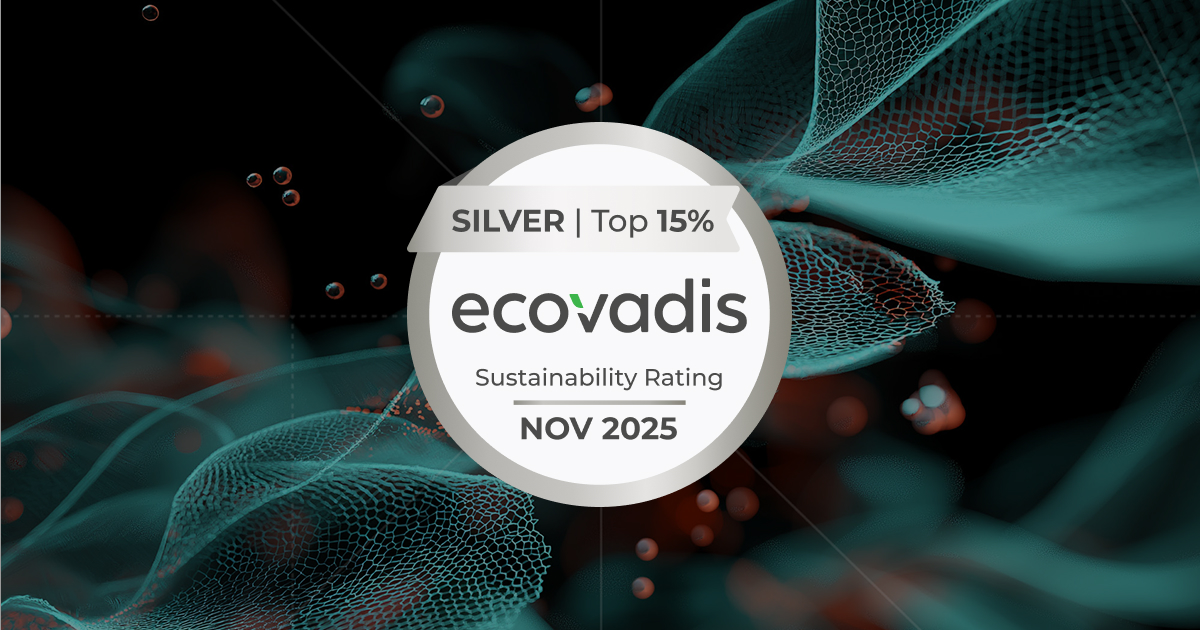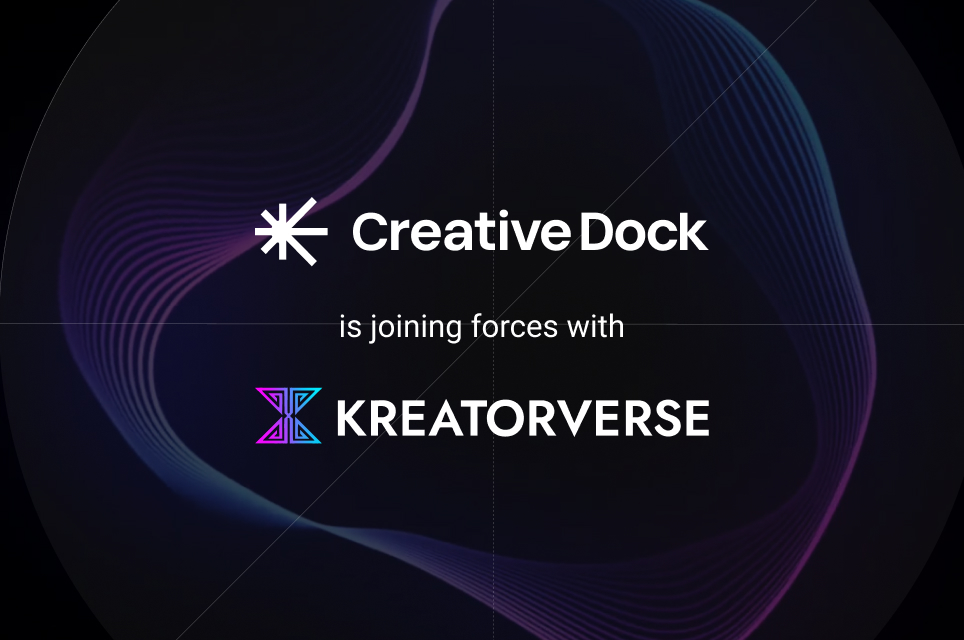Albert Van Veen: I dream of a world without ID cards, keys, multiple different tickets and passes
It might not be surprising that a man who founded FastID, a service to manage your digital identity, would leave very little track online. Therefore, when doing research, you need to challenge your LinkedIn bubble and one of the suggestions you can get is something like “Don’t forget he has four children and he loves talking about them!” So, starting with a question about childhood and the internet seems just appropriate.

Creative Dock is growing, our ambition is to make Europe a digital leader and bring our products to a billion people around the world over the next five years. We are also forming a much tighter circle of people who care about digital as much as we do. Entrepreneurs, current and former CEOs of large banks or insurance companies, headhunters, open minds. We call them Pioneers. Gradually, we will be interviewing them on digitalization and other topics that are close to their hearts. Read an interview with another of our pioneers, Albert Van Veen.

Most of the people I meet make their living on the internet. But at the same time, the same people often say they are glad they grew up without the internet, in the analogue era. Would you have wanted to have access to the internet as a child?
Absolutely! Those people who say they’re glad for a childhood without the internet are subject to a very common thing: when you look at the past, you generally only remember the positive things. You forget the negative ones, it’s just the way our brains are set up. I think a lot of relationships have fallen apart because a husband and wife had a fight over a paper map while on vacation (laughs). How did they actually find hotels back then? Where do you even start with that search? Or restaurants? I wonder how many bad restaurants people had to visit if they couldn’t find out about them beforehand…
And soon it might be even easier to log into all these online services making your life better thanks to your company FastID. Can you explain what it does and where did the idea for such a service come from?
The first idea was that it would be great to have your digital identification always with you — in your phone. But we go even beyond that. We want to do the identification even without your phone — only with your face or your voice. Fast ID provides you with fast and secure access to events and locations with your biometrics.
I like the idea. I installed the app and I still tended to compare it with BankID, which I use in the Czech Republic when I’m in touch with the authorities.
Oh, did you install that? How was the process?
Well, it went quite smoothly, but the only thing is that I signed up with my ID card and the app listed it as a passport. And I can’t change it now…
Oh, really? Can you show me? (At this point I was logging into the app and answering Albert’s questions about whether I registered by taking a picture of my ID or reading the chip of my ID card, whether the special characters worked for my password, we wondered for a while why my ID was showing up as my passport and then Albert asked if he can take a picture of my screen. So I’m walking proof that people really don’t guard their personal information, because mine ended up in the photo gallery on Albert’s phone thanks to the installation of a super-secure app. But I’ll do better next time! Unless Albert has already sold my family’s apartment and used my money to set up a trust fund for his kids’ education.)
So how does your solution differ from other universal ID systems such as BankID we have in the Czech Republic?
I know BankID and we actually cooperate with them. Yet, with BankID your identity is centrally stored at a bank. And if you leave the bank, your identity is gone as well. In our solution, your identity is with you. In your cell phone and you’re the only person who can access it. The only thing we have access to is your email address. As for the rest, you are the only one who has the private key to decrypt it. You can do the registration in a bank with FastID, and they get your information. And when you want to leave the bank, your bank has no longer access to your information. But what we want and what makes even more sense for us is not only to focus on the online but to offer you the offline connection.
What do you mean by offline connection?
Well, imagine you booked a hotel online using something like BankID. Then you arrive at the hotel and you still need to go to the reception desk to show the registration or some ID to prove it’s you. The companies like BankID don’t have your photo so they cannot make a connection between your online registration and you. With our solution, you go straight to your room. You place your mobile phone on the hotel lock, let a camera do a quick scan of yourself and compared it with your photo of your official ID document, and then the door will open. It’s not a plastic card that you can give to someone else to also get in your hotel room, it’s just you and your face.
How long have you been on the market with FastID?
I left Moneta in May 2021 and that’s probably where we started creating the idea for the company. The official start and launch were just really a few months ago, we’re on the market since the beginning of this year.

When you describe FastID, it seems like a really secure and streamlined solution. I guess you probably have no problem gaining users. But what about negotiations with the organizations and institutions? Is it easy to get them on board?
It’s a big change of thinking because companies are used to owning the data. But the legislation to have the data and protect it is getting more and more demanding. Also, it’s also dangerous for users because every time you leave your data somewhere — at a hotel or a car rental — the servers on which the companies store your data may be hacked and your data may leak. And European legislation is increasingly moving towards putting you in control of your own data — you should store it in your own storage and not at twenty different places on the internet.
And what about the companies?
Actually, the more advanced businesses are beginning to realize a digital ID owned by the consumer has a lot of advantages for them. Companies are very aware of is that users don’t like to register. When I was working in Moneta, we saw many times that we were losing potential clients in the registration process. Because when you want to register with a bank, you need to have two documents — an ID card and a driving license or passport. And then they still need to make a “penny payment” from one of their other accounts. And people usually dropped off because they didn’t have the second ID with them or forgot to do the penny payment. Instead, we offer companies a client who is already registered and who is just a click away from using their services. The number of clients that you lose in the registration process becomes a lot smaller with FastID. The idea is that nobody likes to do registration — neither the companies nor clients.
In action movies, we sometimes see that someone steals your identity and you basically cease to exist. Is this possible in reality?
Not only possible but these cases happen from time to time. It is nothing new, an excellent example is “The Serpent” which you can watch on Netflix. I think that’s why the new regulation is coming up. You should be a lot more protective of your own identity and be very careful about where you leave your personal information. This is why there is such a growing need to work on a decentralized identity. And it’s not just about personal data. We should be equally careful with all our passwords.
Isn’t this a well-meant but still scaremongering of a sort?
I had a colleague in ING whose Hotmail, LinkedIn, and other social media accounts were hacked because he was using the same passwords everywhere. And the people who hacked his accounts started to send messages in his name that he really, really didn’t like. On the other hand, this is not new. In the old days, passports were falsified and it actually was a lot easier than it is now. Back then, you could use someone else’s passport by just putting your photo on top of the original one. Nowadays, you have to crack a digital ID, which makes it much more difficult to do that kind of fraud.
For 4 years you were responsible for transforming Moneta’s operations into a digital and agile machine. Was it easy to convince the Czechs to go digital?
The Czech Republic is a very special country and has a more divided society than the rest of Europe when it comes to digital adoption. On one hand, you have a big group of early adopters, who were the first to use new technology like Apple Pay and Google Pay. These people normally live in Prague and they are the front runners in Europe. But on the other hand, there are still loads of people who don’t want to go digital at all. That’s what I had in my mind when I said that society is divided.
What are the practical implications of such a divide?
There is still a big group of people who want paper documents at the bank, who want to pay with cash, and do their taxes on paper. And the big difference with places like Holland is that the Czech Republic keeps on facilitating the people who don’t want to do digital. In Holland, you can’t really choose. All services from the government became digital-only. It has a positive impact on private companies as well — suddenly it became a lot easier to slowly close physical branches. In the Czech Republic, it’s impossible. In such a combination, the digital is just adding costs because you need to keep all your shops open while you also need to go digital.
Why do you think is that?
We did internal research that showed Czechs like to negotiate about the price. They believe that they can get a better price in person. And not only did they believe this, but it also turned out that it was true. The point is Czechs don’t enjoy going to the bank branches more than people in other countries, they just want to get the best price. Exactly like the Dutch people.
Thus, more important than creating a brilliant online experience is to offer the cheapest prices online and communicate this very clearly. I believe this is where the Czech banks can really improve. The digital tools are good enough, it is now about clear pricing and communication.

Do you think there is still an area that resists digitalization? Even if it would make our lives much easier?
Physical money, for example. Isn’t it ridiculous that something like cash still exists? To me, it’s sheer historicism: here’s your paper, give me back some metal coins. It’s not even secure! If someone attacks me, I have to defend my money, there’s no password on it. I think our children will laugh at the concept of physical money. In some countries, cash is disappearing fast. I think that in 20 years cash will no longer exist in the Nordic countries or in Benelux. A different case is Germany. I remember using Apple Pay on my watch to pay at the hospital there. And all of a sudden everyone came running and calling: Er zahlte mit einer Uhr! Er zahlte mit einer Uhr! (He paid with his watch!).
As a Chief Digital and Information Officer at Schiphol, you were responsible for digitizing the airport. How did it go?
I really loved my work at Schiphol airport because I came from an ING bank, and banks are by nature very digital. There’s a lot of digital knowledge, everybody understands data. Moneta is another example where the Board is very digital-focused and skilled.
And then you go to an airport and there is absolutely nothing digital. Back then, in 2014, people still had to print their boarding passes, and show their passports. And we wanted to be the best digital airport in the world. And honestly, it wasn’t that hard because all the other airports were completely non-digital, so everything we decided to do basically meant we were going to be better.
Do you have a vision of how we will travel in the future?
I believe that in 10 years' time it will be quite common to have no queues and no or very little staff at the airports. A lot of the queues exist today because you have to keep showing your ID, you have to hand over your suitcase somewhere, prove it is yours, and go through security. In ten years, there will be no need for ID cards because you will have your face with you. You’ll have a simple chip in your suitcase that will upload all the information about where you’re going. You can already see the improvements. At Schiphol, the security scanning facilities are so good that you don’t have to take your laptop out or put liquids in plastic bags at security gates. In time, no security gates for passport checks will be needed, because the scan of your luggage and identity will be done while you walk through the airport to your gate.
That sounds great! Why do you think it can’t happen faster than in 10 years?
Because we have our habits. We may have the technology and everything we need to do it, but we still have a person sitting behind the counter in the store. You could scan the QR code with the product, pay online, add the receipt to your digital ID and walk out whilst your face is scanned to check that you paid. Nobody has to be there to watch and check if you’ve paid and there should be no queues or extra payment to an American debit or credit card company.
Another example. We already had certificates for self-driving hoovers at Schiphol. And if a hoover is allowed to self-drive at an airport, so could be the services that collect and bring for example passengers to the aeroplane. Or the service to collect the trolleys and refill the stock at shops. All the technology is there already. It’s now about changing mindsets and the management with the guts to change something.
What were your childhood dreams and how do they compare to the dreams you have now?
When I was a little boy, I liked sailing so I dreamed of being a navy captain. I also believe it is great to fight for things you believe in. I kept that dream into adulthood and even considered studying seamanship. The problem with this job is that sometimes you will have to fight for things you don’t believe in. And when you’re in the army, you just have to follow orders. And maybe that’s why I decided not to study seamanship. And now I dream about a world where you can live without tickets, keys, and ID cards. I hate all those things because I keep losing them. In an ideal world, I wouldn’t need any of that.
If you had the knowledge and experience you have now, would you change something in your career?
When you’re deciding on a job, you really need to consider if it’s something that 1) you’re capable to do and 2) will enjoy doing it. If one of the two is missing, it will be a frustrating job over time. If I could go back in time, I wouldn’t take a job when one of the two is missing. I’ve taken some jobs a few times because I was honoured to be offered them, even though they weren’t my cup of tea. I’d be a lot more careful these days. Because even the best-paid job, becomes very frustrating after a while if you don’t like it.



.webp)










%20(1).jpg)































































